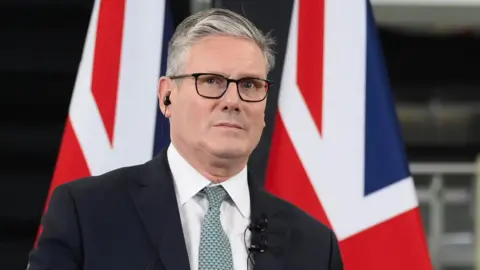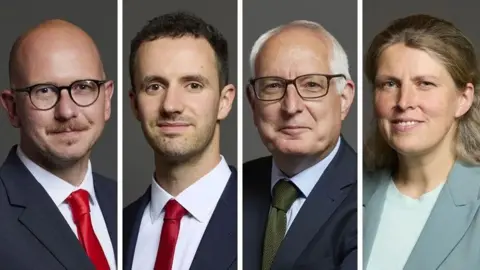Starmer says he had to 'deal with' rebel Labour MPs
 EPA
EPASir Keir Starmer has defended his decision to suspend four MPs, saying Labour has to "deal with" those who defy party orders.
The prime minister argued the MPs were "elected on a Labour manifesto" and so should back the government's agenda.
On Wednesday Labour withdrew the whip from four MPs, meaning they will now sit as independents in the House of Commons - the second major crackdown since Sir Keir took office last year, reigniting debate over his leadership.
Suspended MP Rachel Maskell told the BBC she would not be silenced by Labour withdrawing the whip - but she will continue to support the government as an independent.
Asked if his decision to punish MPs made him look weak, Sir Keir argued Labour were "elected in to change this country for the better, and that means we've got to carry through that change".
"We inherited a broken economy and broken public services," the prime minister said during a press conference with German Chancellor Friedrich Merz.
Sir Keir said: "I am determined we will change this country for the better for millions of working people – and I'm not going to be deflected from that.
"Therefore, we have to deal with people who repeatedly break the whip.
"Everyone was elected as a Labour on a Labour manifesto of change and everybody needs to deliver as a Labour government."
As well as suspending four MPs, Labour stripped three more of their roles as trade envoys - unpaid jobs handed out to backbench MPs.
Maskell told BBC Radio 4's Today programme on Thursday that the chief whip had made it "very clear" to her that her "work on the disabled people reforms were the reason" for her suspension.
Maskell, who represents York Central, had described the government's planned welfare changes as "Dickensian cuts which belong to a different era and a different party".
She was a key figure in the rebellion that led to an eventual government climbdown but told the BBC: "I don't see myself as a ringleader."
Instead, she said her aim was to "advocate" for her constituents, including disabled people who "are very invisible in our society".
Now sitting as an independent, she said she would do "all that I can to support the Labour government".
"But that doesn't mean that I'm silenced," she told BBC Breakfast, adding that she did not believe the prime minister had "got it right".
"If my constituents are telling me something, I want to be able to advocate," she said.
The welfare bill broke down because backbenchers weren't listened to in the early stages, she said, and this must change "because ultimately backbenchers bring vast experience with them".
These suspensions were designed to send a message to Labour MPs first elected at last year's general election, many in the party believe.
Three of the suspended MPs – Neil Duncan-Jordan, Brian Leishman and Chris Hinchliff – are members of the 2024 intake representing constituencies in which a Labour victory would have been all but unimaginable until shortly before the election.
While those on the left of the Labour Party have been vocal in their criticism of the suspensions, many loyalists are happy to see their colleagues being punished for rebelling.
Some of the new intake felt it was unfair that they had been willing to defend controversial decisions in their constituencies and local Labour parties but then were being treated essentially the same as their rebellious colleagues who forced the government into a humiliating climbdown on welfare.
One source characterised the message being sent as: "Loyalty will be rewarded."
That is further entrenched by the removal of trade envoy jobs from three MPs.
Labour minister Phillips said that, from what she could see, "this is nothing to do with someone voting against a particular bill".
Ministers were forced to water down their plans after 47 Labour MPs rebelled against the government's proposed cuts to welfare, but only four were suspended Philips pointed out.
The suspensions were instead for people "constantly going on the airwaves, slagging off your own government," she said.
She also dismissed the idea that MPs could not raise concerns with the government.
"There is absolutely no reason why people cannot speak up about the things that they care about, but we do have to work as a team," Philips told BBC Breakfast.
It further undermined the prime minister's authority after a series of policy reversals, including restoring the winter fuel allowance to millions of pensioners.
A senior Labour MP said the suspensions had left some backbenchers in a "state of shock".
Toby Perkins told BBC Radio 4's The World Tonight late on Wednesday: "There's a number of colleagues who voted against that (welfare) legislation who are wondering if their phone is going to ring."
While he said some MPs would now think "very, very carefully" before voting against the government, he said there would be others "who feel this is an overreaction."
 UK Parliament
UK ParliamentDuncan-Jordan, the MP for Poole, had organised a letter warning the government's welfare changes were "impossible to support" without a "change of direction".
After his suspension, he said he remained committed to Labour's values and that it was "business as usual" for his constituents.
Leishman, the MP for Alloa and Grangemouth, said in a statement that he wished to remain a Labour MP and added:"I firmly believe that it is not my duty as an MP to make people poorer, especially those that have suffered because of austerity and its dire consequences."
North East Hertfordshire MP Hinchliff likewise said he hoped to return to the Labour benches and would continue to "fight every day for the needs of my constituents".
Three other Labour MPs - Rosena Allin Khan, Bell Ribeiro-Addy and Mohammed Yasin - were stripped of their roles as trade envoys.
